
Professional Skills Training: Communication
Video Content

Independence Day [2021/22]
A reliable Insurance company is considering the best option for a tranche of its business. Colette (Actuarial Director) puts Marco (Senior Actuary) in charge of the project but indicates the answer she’s looking for. Marco’s team does the analysis and despite him knowing that it doesn’t give the result Colette was looking for, feels compelled to follow his professional instincts regardless.

Judgement Day [2021/22]
Rhiannon, an actuary, gives advice in two different circumstances - each of which she believes is ‘valid’. However, whilst everyone was happy about the first set of advice, Steven, the scheme’s Member Trustee, cannot understand, nor justify, the apparent inconsistencies between this and what Rhiannon is about to propose.

Heated Discussion [2020/21]
Kit and Anthony, both actuaries, have been invited to participate in a "Climate Change Special" TV production in the context of a "Risk Alert" published by the IFoA on "Climate Related Risks". Although representing the IFoA, it becomes less clear during the interview whether they are presenting a view from the IFoA, their employers or their own personal views. Faced with a seasoned interviewer who has done her research on views represented by each of the participants on previous occasions - let's see if the interview goes according to plan...
Heated Discussion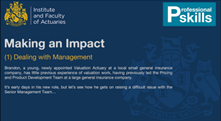
Making an Impact [2020/21]
Brandon, is a young, newly appointed Valuation Actuary at a local small general insurance company. He has had little previous experience of valuation work, having previously led the Pricing and Product Development Team at a large general insurance company. There are three scenarios – the first is where he has to deal with a difficult issue with the Senior Management Team; the second is where he has to make a presentation to the Board; and the third is where he has to manage more experienced and junior members of staff.

New Boss, New Approach [2020/21]
Rachael was promoted to Head of Valuations 2 years ago at the firm she joined as a trainee some 8 years earlier. She has a good rapport with the Chief Actuary, Brian, who is about to retire and helps him produce key reports for the firm. Things change however once his successor, Harry, is in place and Rachael struggles to adapt to a new style of leadership and approach.

Three Days [2020/21]
Clyde has been with the company for four months and has just been added to the client team for a large, important client, Massomax, headed by team-leader Danica. To date Clyde has also been working for smaller clients which earn less in fees, including TiniMicro, with team-leader Susan. Clyde has a statutory deadline approaching for TiniMicro and there will be a fine if he misses it. However, Danica urges Clyde to prioritise work for their bigger paying client Massomax, hinting that prioritising her work will be good for Clyde’s career progression. See what happens when Clyde attempts to resolve the competing pressures.

Too Close for Comfort [2020/21]
Marcus and Alison are both actuaries and a married couple work at competing firms. Here they describe, via phone calls and video diaries, the pitfalls of working from home, sharing a makeshift office and having to manage confidential processes in a confined space. Confidential information on screens and Marcus’s inquisitive mother make balancing work and two young daughters at home much more challenging than necessary.

Shortcut to Success [2019/20]
Niels, a partner in the firm, has set a multidisciplinary project team a deadline of one week to come up with a best estimate price for a particular project. The team are set to work long hours and get off to a good start. However the following day, things start to look less clear and the team are under pressure to meet the Friday deadline. On Wednesday Niels bursts into the project room looking for a result as he still needs to get approval and deliver the report by Friday. The team are taken aback that the deadline has now shrunk by two days and they are under pressure to come up with a recommendation.

Slippery Slope [2019/20]
Susan, a Risk Actuary, is faced with a dilemma when asked to deputise for the Chief Risk Officer, Don, in his absence, at a proposal meeting the following day. Susan learns that Ian, the Financial Director, has submitted a proposal to get the go-ahead for a new insurance product at the meeting and knows that the Sales Director, Raymond, will be keen to launch the product the following month. Susan has concerns about the short timescale to thoroughly review the risks and is worried about the potential impact on the company's profitability and audit. However, she comes under considerable pressure from Ian to support the product launch at the meeting.
Slippery Slope
Time off [2019/20]
Andrew, a partner at a small actuarial consultancy, is keen to win a new property modelling project. A tender proposal is drawn up citing Kieran as the firm's properly modelling expert, despite Kieran making it clear that he is no expert in this area and in any case is about to go off on 6 months' paternity leave. Nonetheless, the proposal is submitted and the consultancy is awarded the contract - what now?
Time off
Challenging Advice [2017/18]
The 'Yes We Care' Defined Benefit Pension Scheme is carrying out its triennial valuation. The trustees of the Scheme have appointed Sheila as scheme actuary. Mark, the firm’s investment actuary, uses the firm’s economic scenario generator (ESG) to develop expected returns on the trustees’ portfolio of assets, including a probability range. Mark also gets input from the scheme’s investment consultants “We Invest You Benefit’. Mark, who used a different but equally tried and tested ESG, arrived at a similar ballpark figure for the discount rate for the triennial valuation which is about 1.5% down on the previous valuation. See how the trustees react.
Challenging Advice
Factor Fiction [2017/18]
The 'Widgets-R-Us' Pension Scheme, closed to new employees last year, whilst still fragile, continues to pay benefits to members reaching 65. The Chairman of the Trustees and Financial Director, George, explains an option within the Scheme which enables retiring members to convert part of their pension into cash, to the Chief Executive Officer, Bridget. Sophie, the Scheme Actuary, is put in a difficult position at a members’ strategy meeting later that day, when George enthusiastically invites her to present the benefits of commuting their pensions.
Factor Fiction
Singaporean Life [2017/18]
Andrew, an IFoA qualified actuary, returns to Singapore having been promoted to a senior role in an international Life Assurance company following a 2 year stint in their Head Office in Geneva, Switzerland. A few months into the role Andrew is facing some professional dilemmas and is feeling rather isolated in this international, multidisciplinary environment.
Singaporean Life
That was my idea too! [2017/18]
Peter, a junior actuary in the actuarial department of an insurance company, has recently moved to the Asset and Liability Modelling (ALM) team. They are a very close team and Peter is having some difficulty settling in and feeling part of the team. Peter comes up with an innovative idea around managing the firm’s currency risk and shares this with his boss, Fern. The idea then gets presented to the Asset Liability Committee but it has come across as Fern’s and the others’ idea.
That was my idea too!
Look before you Leap [2016/17]
Mike and Samantha are experienced actuaries and co-founders of their two person actuarial consultancy. On the strength of winning a lucrative contract with Gertax Insurance, a small but successful company, Mike agreed with Samantha to invest significantly to update their IT equipment. However, upon re-reading the project definition ‘terms of reference’ document Mike is dismayed to see that it is not as robust as he would wish. Difficult discussions with the client’s project sponsor follow and Mike is left in no doubt that he will need to deliver or face the consequences.
Look before you Leap
Capital Modelling [2015/16]
The firm has completed their £30m Solvency II project successfully, and has been advised that the Internal Model approval has been granted by the Regulator. The company's CFO is pleased, and anticipates a return to a more normal level of costs, given the investment in this priority project. Now the company has the ability to set its own capital for regulatory purposes, the CFO also intends to make full use of this capability. The Capital Actuary, however views the initial model approval as simply a project milestone and that further investment is needed for improvements.
Capital Modelling
Lost in Transmission [2015/16]
Watch what happens when three actuaries, Stefan, Georgina and Viraj, in ascending order of management, play their parts in the preparation of a report for the Board. Where does responsibility lie in ensuring that the report is communicated clearly and understood by the receiving Board?
Lost in TransmissionMini Case Studies

Chat IT Over [2020/21]
Sébastien, an actuary working for a consultancy that designs chatbot algorithms, finds himself having to explain some inappropriate chatbot product recommendations to the Insurance Regulator.
Chat IT Over
Do Two Wrongs make a Right? [2020/21]
You notice that the spreadsheet you are working on has an error but that another error reverses the first error so there is no net impact on results. Do you keep quiet or speak up?
Do Two Wrongs make a Right?
Communicating Complexity [2020/21]
Li, an actuary, has the unenviable task of explaining her approach to develop a predictive model for pricing new health insurance products to the company's Strategy Committee.

Risky Business? [2020/21]
Ning, an actuary, works within a team of actuaries and data scientists which has developed an underwriting tool which uses machine learning from a variety of data sources. The results are used to calculate customer premiums based on a risk score. What are the implications?
Risky Business?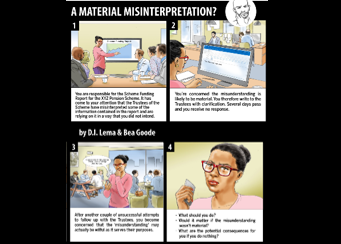
A Material Misinterpretation [2018/19]
You've flagged to the Trustees of a Pension Scheme that they have misinterpreted information in your Scheme Funding Report but don't hear any more about it despite following up in writing.
A Material Misinterpretation
Personal meets Professional [2018/19]
You are concerned when you come across a heated exchange on a social network involving one of your senior actuarial colleagues and show the posts to your line manager, who doesn’t share your concerns as your colleague has posted on their personal page. Are you satisfied with her response?
Personal meets Professional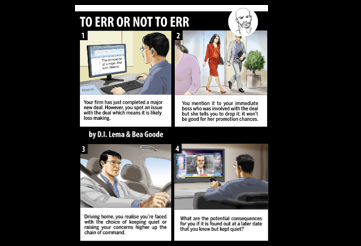
To Err or not to Err [2018/19]
You spot an error which means that a major new deal is likely loss making. You raise the issue with your boss who was involved in the deal who tells you to keep it quiet as it will impact negatively on them.
To err or not to err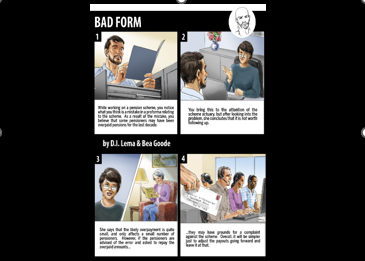
Bad Form [2017/18]
You discover what you believe to be a mistake which has resulted in some pensioners being overpaid pensions for the last decade but when you mention it to the Scheme Actuary, they are not inclined to rectify the error and to simply adjust pay-outs going forward.
Bad Form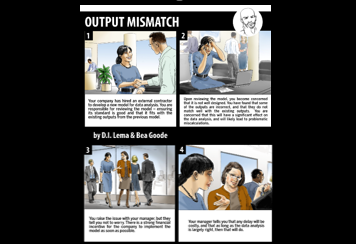
Output Mismatch [2017/18]
You are responsible for reviewing a new model for data analysis being developed for your company by an external contractor. You have some concerns that some of the outputs are incorrect but when you flag this to your manager he is more concerned about the financial implications of delayed implementation.
Output Mismatch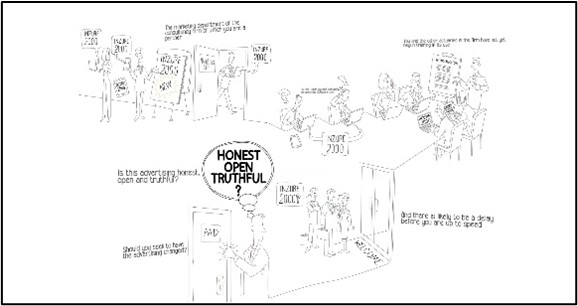
Overstating the Facts [2016/17]
You are a partner at a consultancy firm and learn that the marketing department has begun advertising the firm’s use of a new set of software which will bring advantages for your clients. However, this seems premature to you as users within the firm have yet to be trained. What should you do?
Overstating the Facts